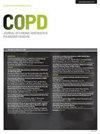胸部 CT 诊断为肺气肿的非严重缺乏症患者中的α-1 抗胰蛋白酶基因变异体
IF 3.1
3区 医学
Q1 Medicine
International Journal of Chronic Obstructive Pulmonary Disease
Pub Date : 2024-02-03
DOI:10.2147/copd.s448593
引用次数: 0
摘要
简介:尽管α-1抗胰蛋白酶(AAT)缺乏症导致的肺部受累已被广泛描述,但大多数研究都集中在导致严重缺乏症(< 60 mg/dL)的基因型上:本研究旨在分析经胸部计算机断层扫描(CT)确诊的肺气肿患者中不会导致严重缺乏症的不同 AAT 基因变体的患病率。此外,我们还评估了肺气肿发病机制中与 AAT 值非严重下降相关的风险:方法:采用病例对照研究设计,纳入可进行整个胸部 CT 扫描的患者。共分析了176名肺气肿患者(病例)和100名未患肺气肿的对照受试者:病例(25.6%;45/176)的变异率高于对照组(22%;22/100),但从整体分析,差异无统计学意义(P=0.504)。在对照组中,检测到的所有变异均为 MS。除去该变体,其余变体(MZ、SS 和 SZ)均存在显著的统计学差异。只有 18% 的对照组(均为 MS)的数值低于我们的正常值极限,而且所有对照组的数值都非常接近参考值(90 mg/dL)。与此相反,76% 的其他变异型患者出现了病理水平。在逻辑回归模型中,吸烟和甲羟戊酸非严重降低(60 至 90 毫克/分升)都会增加肺气肿的概率:我们的研究证实,α-1 抗胰蛋白酶基因中某些不会导致严重缺乏的变体与肺气肿之间存在关联。这种与血清 AAT 值降低相关的变异具有统计学意义,且与吸烟习惯无关。关键词:肺气肿、α-1 抗胰蛋白酶、缺乏、变异本文章由计算机程序翻译,如有差异,请以英文原文为准。
Alpha-1 Antitrypsin Gene Variants in Patients without Severe Deficiency Diagnosed with Pulmonary Emphysema on Chest CT
Introduction: Although pulmonary involvement due to alpha-1 antitrypsin (AAT) deficiency has been widely described, most studies focus on the genotypes causing severe deficiency (< 60 mg/dL).
Objective: The aim of this study was to analyze the prevalence of the different AAT gene variants that do not cause severe deficiency in patients with pulmonary emphysema diagnosed by thoracic computed tomography (CT). Furthermore, we assessed the risk associated with a non-severe decrease in AAT values in the pathogenesis of emphysema.
Methods: Case-control study design that included patients who had a CT scan available of the entire thorax. In total, 176 patients with emphysema (cases) and 100 control subjects without emphysema were analyzed.
Results: The prevalence of variants was higher among cases (25.6%; 45/176) than controls (22%; 22/100), although the difference was not statistically significant (P=0.504) when analyzed globally. In the control group, all the variants detected were MS. Excluding this variant, statistically significant differences were observed in the remaining variants (MZ, SS and SZ). Only 18% of the controls (all MS) presented values below our limit of normality, and all had values very close to the reference value (90 mg/dL). In contrast, 76% of patients with the other variants presented pathological levels. In a logistic regression model, both smoking and a non-severe reduction in AAT (60 to 90 mg/dL) increased the probability of emphysema.
Conclusion: Our study confirms an association between certain variants in the alpha-1 antitrypsin gene that do not cause severe deficiency and the presence of pulmonary emphysema. This association with variants that are associated with reductions in serum AAT values is statistically significant and independent of smoking habit.
Keywords: emphysema, alpha-1 antitrypsin, deficiency, variants
Objective: The aim of this study was to analyze the prevalence of the different AAT gene variants that do not cause severe deficiency in patients with pulmonary emphysema diagnosed by thoracic computed tomography (CT). Furthermore, we assessed the risk associated with a non-severe decrease in AAT values in the pathogenesis of emphysema.
Methods: Case-control study design that included patients who had a CT scan available of the entire thorax. In total, 176 patients with emphysema (cases) and 100 control subjects without emphysema were analyzed.
Results: The prevalence of variants was higher among cases (25.6%; 45/176) than controls (22%; 22/100), although the difference was not statistically significant (P=0.504) when analyzed globally. In the control group, all the variants detected were MS. Excluding this variant, statistically significant differences were observed in the remaining variants (MZ, SS and SZ). Only 18% of the controls (all MS) presented values below our limit of normality, and all had values very close to the reference value (90 mg/dL). In contrast, 76% of patients with the other variants presented pathological levels. In a logistic regression model, both smoking and a non-severe reduction in AAT (60 to 90 mg/dL) increased the probability of emphysema.
Conclusion: Our study confirms an association between certain variants in the alpha-1 antitrypsin gene that do not cause severe deficiency and the presence of pulmonary emphysema. This association with variants that are associated with reductions in serum AAT values is statistically significant and independent of smoking habit.
Keywords: emphysema, alpha-1 antitrypsin, deficiency, variants
求助全文
通过发布文献求助,成功后即可免费获取论文全文。
去求助
来源期刊

International Journal of Chronic Obstructive Pulmonary Disease
RESPIRATORY SYSTEM-
CiteScore
5.10
自引率
10.70%
发文量
372
审稿时长
16 weeks
期刊介绍:
An international, peer-reviewed journal of therapeutics and pharmacology focusing on concise rapid reporting of clinical studies and reviews in COPD. Special focus will be given to the pathophysiological processes underlying the disease, intervention programs, patient focused education, and self management protocols. This journal is directed at specialists and healthcare professionals
 求助内容:
求助内容: 应助结果提醒方式:
应助结果提醒方式:


